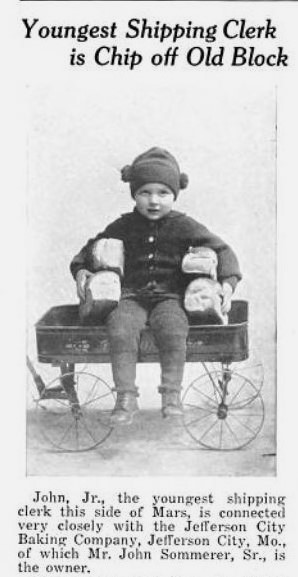John Sommerer owned the Vienna Bakery at 302 E. High St. when he found fellow bakers to invest in a new venture.
The Jefferson City Baking Company (JCBC) was incorporated Feb. 9, 1909, and was valued at $6,000. The original investors were Julius Conrath (30 shares), John Sommerer (30 shares), Joseph Stradkoetter (30 shares), Emil Mueller (15 shares) and Fred Mueller (15 shares).
The Muellers had the East End Bakery at 626 E. High St. Julius Conrath's bakery was at 224 E. High St. and Joseph Stradkoetter was its baker. The purpose of the new company was to "manufacture and sell bread, cakes, confectionery and such other goods as are usually manufactured in a bakery."
The company purchased the lot at the southwest corner of East High and Chestnut in 1909 -- the address was 830 E. High St. John Sommerer was president and manager, and Fred Mueller was treasurer for the company.
According to newspaper accounts, "At that time, the building was small, the equipment limited and the bakery, with but one oven, sold some 1,000 loaves of bread a day."
"At the start, the company employed six men and all deliveries were made with two horse-drawn wagons."
The adjacent property to the west was purchased in 1917 and production was expanded. In August 1918, a complaint was made to the Justice Department that JCBC was "putting rye bread on the market with a label bearing the picture of Prince Henry of Prussia, a brother of the Kaiser with an inscription in the German language." Sommerer admitted such labels were being used, but new labels had been ordered bearing the inscription "American Beauty Bread" and the 250,000 labels on hand would be destroyed.
The Sunday News reported in 1929 the company had four floors containing: "Retail department, packing and shipping department, wrapping department, mixing department, kneading, weighing, molding department, ware rooms and garage. There is also a refrigerating system and an airy, light aging room for all the flour used in the various products turned out.
"Today it takes twenty-six people to carry on the work of the bakery and ten big trucks to do the delivering over a radius of seventy-five miles. In addition, they ship large amounts by express, parcel post and bus routes.
"These ovens are monstrous, containing enough brick alone to build ten ten-room houses. The depth of these ovens is fourteen feet and the width twelve feet. Six thousand loaves of bread an hour can be baked in them. They are heated by coke."
The company's leading seller was Quaker Bread in its "new stream-lined wrapper." Chillicothe, Missouri, claims to have had the first automatically sliced commercial loaves produced in 1928, using a machine invented by Otto Rohwedder.
The Jefferson City Baking Company was not far behind. A 1935 article in the Sunday News and Tribune reported, "The slicing machine runs the loaf through a set of vertical blades, which cuts it into even slices, saving the housewife a great deal of work. Then, in the wrapping machine, the loaf is so tightly and carefully wrapped that no air can enter to spoil the freshness of the bread." The same article says the company produces 10,000 loaves of bread a day as well as pastries and other bakery products.
This bakery was known for the brand names Quaker, Mr. Freshie and Hobo Bread. They baked Vienna, rye, carraway rye, gluten, graham, salt rising and health bread. In addition, they baked cakes, rolls, buns and cookies.
The Jefferson City local of the Bakery and Confectionery Workers International Union of America called a strike Sept. 2 against Jefferson City Baking Company and two other bakeries in Jefferson City. The companies had refused a union contract providing shorter hours and higher pay. But sufficient non-strikers remained at their posts to keep production at normal levels. Six workers walked out and 11 workers remained at JCBC. Sommerer stated, "We just simply can't meet their demands and stay in business." The strike was finally settled Oct. 21, but Sommerer refused to hire back two of the strikers.
John Sommerer died in 1966 at the age of 95. He was a member and past president of the Missouri Baker's Association, past director of the American Baker Association, a director of the Central Missouri Trust Co. for 35 years and served as a judge on the Cole County Court.
John Jr. and Carl Sommerer worked hard to keep the company going in the 1960s. Carl Sommerer Jr. speculates "other bakeries in the country were growing larger and looking for new markets. One of those, or perhaps several -- Metz, Holsum, Continental or another -- became very aggressive with predatory pricing in the market in which JCBC operated." The company could not compete and went out of business.
Holsum Bakeries occupied the building in 1969 and then moved to West Dunklin after which there was no longer a bakery at 830 E. High St.
Deborah Goldammer is a retired state employee with interest in Jefferson City history. She is a former officer and board member of Historic City of Jefferson.


